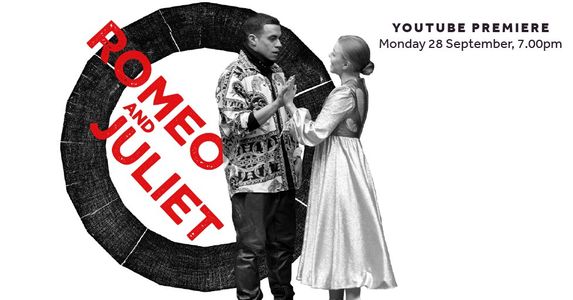
September 28, 2020, by Peter Kirwan
Romeo and Juliet (Playing Shakespeare with Deutsche Bank) @ Shakespeare’s Globe
The Globe’s choice to release recordings of its Playing Shakespeare productions for young people alongside several of its summer season productions during lockdown has been an inspired choice. Fast, clear and full of energy, Michael Oakley’s version of Romeo and Juliet – filmed efficiently by Glenn Barton – gets a laugh as the Chorus (spoken by Romeo and Juliet themselves) announces the ‘ninety minutes’ traffic of our stage’. But if the production occasionally feels a little rushed in its effort to meet the clock, this is a surprisingly invigorating version whose frenetic speed makes chaotic sense of the freewheeling romance of the central lovers, and finds some fresh readings.
The production pitches at something timeless, cleverly playing with fashion outdoor-wear for both adults and younger characters, creating an aesthetic of plastics and waterproofs that feels appropriate to the wintry day on which the performance was filmed, but also allows for an alt-universe feel; Mercutio, Romeo and Benvolio wear identical shirts with colour-coded trousers, while the Capulet women evoke a dialled-down Hunger Games with big hair, severe costumes with frilly finishes, and some startling eye shadow. The overall effect is brought down to earth by the live brass band, who switch cheerily between fast jazz and mournful colliery band-style laments. It’s a world which lacks obvious fixed reference points, but is internally consistent with itself, enacting a generational clash that allows different styles and moods to quickly come into conflict with one another.
This is perhaps most obvious at the Capulets’ ball. The ball begins with a quite beautiful dance between Charlotte Beaumont’s Juliet and Christopher Chung’s Paris, Paris gently twirling Juliet about the stage to a slow number. Then, wearing studded black balaclavas that can’t help but look a bit like gimp masks, Nathan Welsh’s Romeo and Shalisha James-Davies’s Benvolio take to the dance floor to lead the partygoers in a more contemporary group dance, propelled by Ned Derrington’s Mercutio on the drums. Where Juliet enjoyed the dance with Paris, she’s completely swept away by this joyful routine, and slips easily into her initial conversation with Romeo.
There’s no time for Romeo and Juliet to moon over one another. Welsh and Beaumont instead play the parts for open-hearted warmth. Beaumont has some great line delivery – with an enormous smile, her lingering on ‘any other part / Belonging to a man’ shows exactly what she’s thinking about, and her scorning of Paris when they meet at Friar Laurence’s cell is particularly cutting. Her ability to play young and sincere gives the first half of the production a lot of its liveliness – she’s one of the most mischievous-looking Juliets I’ve ever seen – which makes the severity of the second half all the more effective. Stuart Bowman is a brutal Capulet, who drags Juliet bodily from her bed when she tries to stand up to him and refuses to marry Paris, throwing her forward on the stage and leaving her no option.
Romeo, meanwhile, is at the heart of a story of repressed violence. The play begins with just a single Capulet and Montague feuding, before the larger brawl breaks out, meaning that Derrington’s Sampson has to fuel his own conflict in challenging Abraham, rather than having a Gregory to play off. The company does a fine job of creating the performative masculinity that leads to violence. Mercutio has constant business with a pair of drumsticks, which serve as makeshift swords, clock hands, penises (often all in the same sentence, as in his interaction with the Nurse) and extensions of his manically gesturing arms. Tybalt (Ayoola Smart), regendered as female, is the coolest looking character on the stage and bad-ass to boot, lithe and severe in her movements, refusing to be drawn into play and instead moving quickly to violence – her stabbing of Mercutio is so fast that it’s left ambiguous for a long time whether or not he’s hurt, until a sudden cough spurts up an ocean of blood. All of this affects Romeo, whose showdown with Tybalt is shockingly violent, he twisting her arm around and stabbing her in the belly before punching her across the face until she collapses, unmoving, on the floor.
It’s not all violence. There are some great comic points, including Paris’s smug entrance with his brass band while the Capulet family weep over Juliet’s ‘corpse’, and Debbie Chazen’s Nurse is amusing, especially as she is first taken by Mercutio’s flirting, then exhausts herself chasing him to hit him with her shoe. But what emerges most powerfully from this short production is the earnestness of its leads. Leaning into the play’s speed (Romeo and Juliet are barely offstage for their wedding when Benvolio and Mercutio are back on preparing for the fight), the overall effect is of a whirlwind escalation of events in the midst of which the two lovers barely have time to reach for one another. It’s at the end, as the adults arrive to find the bodies of their children, that the production finally slows down and allows the weight of their fate to be keenly felt.
Previous Post
The Merry Wives of Whatsapp (Creation) @ ZoomNo comments yet, fill out a comment to be the first

Leave a Reply